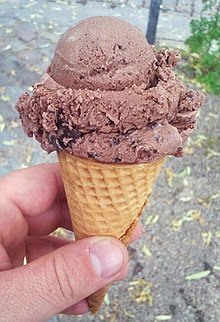Chocolate ice cream

Chocolate ice cream in a cone
|
|
| Type | Ice cream |
|---|---|
| Main ingredients | Cocoa powder, eggs, cream, vanilla, sugar |
| |
|
Chocolate ice cream is ice cream with natural or artificial chocolate flavoring. Chocolate is the second most common flavor of ice cream in the United States, after vanilla.
The earliest frozen chocolate recipes were published in Naples, Italy in 1693 in Antonio Latini's The Modern Steward. Chocolate was one of the first ice cream flavors, created before vanilla, as common drinks such as hot chocolate, coffee, and tea were the first food items to be turned into frozen desserts.Hot chocolate had become a popular drink in seventeenth-century Europe, alongside coffee and tea, and all three beverages were used to make frozen and unfrozen desserts. Latini produced two recipes for ices based on the drink, both of which contained only chocolate and sugar. In 1775, Italian doctor Filippo Baldini wrote a treatise entitled De sorbetti, in which he recommended chocolate ice cream as a remedy for various medical conditions, including gout and scurvy.
Chocolate ice cream became popular in the United States in the late nineteenth century. The first advertisement of ice cream in America started in New York on May 12,1777 when Philip Lenzi announced that ice cream was officially available "almost every day". until 1800 ice cream was a rare and exotic dessert enjoyed mostly by the elite. Around 1800 insulated houses were invented and manufacturing ice cream soon became an industry in America.
Chocolate ice cream is generally made by blending cocoa powder along with the eggs, cream, vanilla and sugar used to make vanilla ice cream. Sometimes chocolate liquor is used in addition to cocoa powder, or it is used exclusively, to create the chocolate flavor.Cocoa powder gives chocolate ice cream its brown color, and it is uncommon to add other colorings.
The Codex Alimentarius, which provides an international set of standards for food, states that the flavor in chocolate ice cream must come from nonfat cocoa solids that must comprise at least 2.0-2.5% of the mix weight. The US Code of Federal Regulations "permits reductions in the content of milk fat and total milk solids by a factor of 2.5 times the weight of the cocoa solids", in order to take into account the use of additional sweeteners.
...
Wikipedia
